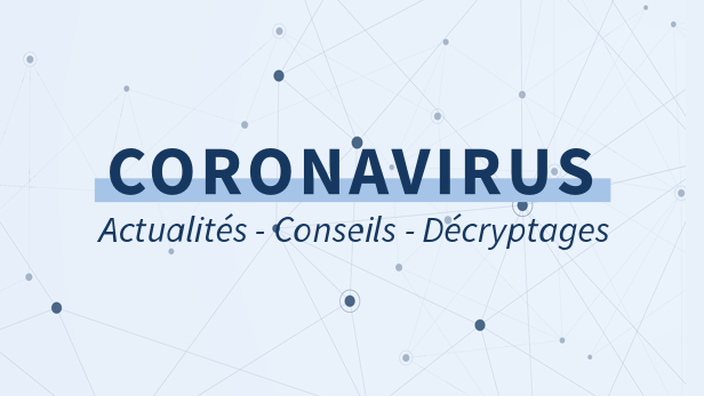Hello,
It is a word that we would have liked to erase from our vocabulary and which resonates painfully in our ears today.
Faced with the
fifth wave
of the Covid-19 epidemic which is confirmed in Europe,
Austria is
imposing
confinement
on the unvaccinated.
In France, "
there are no plans to take additional measures,
" assured Gabriel Attal on leaving the Council of Ministers on Wednesday.
Confining the
more than 6 million unvaccinated people
, making the health pass dependent on vaccination, so many avenues that would risk dividing the French a little more.
So what?
Maintenance of barrier gestures,
vaccination booster
, health passes and wearing a mask remain our best weapons for the moment.
Good reading,
Camille Lestienne, journalist at
Le Figaro
.
1. The fifth wave is confirmed
Even if the vaccination rate must protect the hospital from saturation, the fifth wave of Covid-19 is worrying.
PASCAL GUYOT / AFP
Breaking wave.
"
She arrives in France, which was the good student with Spain and Italy because of our level of vaccination, but she is there",
declared the president of the Scientific Council Jean-François Delfraissy, Wednesday, on
France Inter
. The latest indicators - more than 20,000 cases detected yesterday, a figure unseen since August - confirm the reality of the fifth wave of Covid-19 in France. It was announced in our European neighbors first of the east then of the north, with consequences on hospitalizations and mortality even in the most vaccinated countries. "
The increase in the number of infections will arithmetically translate into an increase in severe cases - even if the risk is reduced in those vaccinated",
thus confirms the epidemiologist Antoine Flahault
.
Despite protective vaccination coverage in France, the European experience teaches us that
"we should not expect this recovery to dissipate spontaneously"
, notes for his part the researcher Mircea Sofonea who is counting on a strengthening of barrier gestures. , screening and isolation of patients.
Vaccination, however, has greatly reduced the hospitalizations of the most fragile according to a study by DREES.
During the fourth wave, the weekly numbers of cases and deaths decreased by 94% and 96% for residents in nursing homes, compared to the second wave.
Read alsoCovid-19: is it normal that there are now more vaccinated than unvaccinated in the hospital?
The figures to remember in France
1300
patients in critical care (+23 since the day before)
7663
hospitalized patients (+128 since the day before)
20,294
new cases detected in 24 hours
50
deaths in 24 hours in hospital (118,303 deaths since the start of the epidemic)
Source: Public Health France as of November 17
2. The return of confinement?
In Austria, only the vaccinated can access non-essential shops.
LISI NIESNER / REUTERS
What to do in France?
Following the European countries which take restrictive measures, what should France do? The debate is open. The presidential majority does not want to follow the Austrian example and confine the only unvaccinated. All the assumptions remain on the table, however, "
because we are facing a virus which surprises us and can still surprise us
", conceded Christophe Castaner, the boss of LREM deputies. Would that at least be possible in France? “
Currently, the only discrimination that a health emergency allows is on a geographic basis
", Notes Jean-Philippe Derosier, specialist in constitutional law, but the state of health emergency could still allow the implementation of an exceptional measure. However, at the risk of dividing the French a little more. Several scientists are arguing for their part to make obtaining the pass dependent on vaccination alone. A solution which, too, would fuel tensions and would be counterproductive, answers Pierre Parneix, medical officer of the Bordeaux University Hospital and member of the management of the health crisis at the Elysee. As for the use of teleworking, "
we are not there yet
", indicated the Minister of Health Olivier Véran, but it "
is part of the measures that we could mobilize
".
In the meantime, several departments are extending or tightening the obligation to wear a compulsory mask outdoors.
Read also Covid-19: are the key decisions in the management of the pandemic classified as a defense secret?
What are the others doing?
Austria caught everyone by surprise by taking a shocking decision last Sunday that brought cohorts of protesters to the streets of major cities. Unvaccinated people have been confined since Monday with a ban on going to bars, restaurants, sports halls, cultural places, but also from visiting someone in a hospital and shopping in shops. non-essential. To go to work, you must regularly provide the results of a negative test. In Latvia, it is unvaccinated deputies who are deprived of a vote, debate and salary. Russia, very severely affected by the pandemic, is in turn considering a health pass when just over a third of the population is now vaccinated. In Germany,the government hesitates and leaves the power to the regions to take new measures, such as in Berlin where only the vaccinated and cured of the Covid have access to restaurants, bars or sports halls. A situation summed up by the Spiegel: "
Welcome to chaos,
”headlined the weekly's website on Monday morning.
Read also Police raids and arrests among Italian anti-pass
3. More than six million unvaccinated French people
More than six million eligible French people are not vaccinated.
ERIC GAILLARD / REUTERS
Who are the unvaccinated?
Le Figaro
wanted to know who these French people were who, "
by conviction or lack of information, fear or isolation, have not yet been vaccinated
". They are about 6.5 million, many minors, in their thirties but also 500,000 people over 80 years old. Geographical differences are also very marked with the departments of the Atlantic coast which play the good students while Yvelines, Ain and Haute-Corse have rates of less than 80% of vaccinated. Overseas territories are still lagging behind. Among the vaccinated, the pace of the booster campaign has accelerated. During the day of Tuesday, "
nearly 200,000 booster doses were injected, it is a record
», Declared the spokesman of the government at the exit of the Council of Ministers.
The figures to remember in France
51.6 million
people received a first dose (76.9% of the population).
50.5 million
French people have a complete vaccination schedule (75.2% of the population).
4.8 million
booster doses administered (7.2% of the population).
Source: Directorate General of Health as of November 16
4. The brain, a victim of Covid
So everything seems to indicate that somehow Sars-CoV-2 does much more than attack our lungs.
Soline Roy, journalist at Le Figaro
Anosmia, seizures, stroke, loss of consciousness, confusion ... people with Covid-19 often have neurological symptoms even in mild forms of the disease. A European study published in
Nature Neuroscience
proposes a microvascular track: "
the virus would destroy cells lining the blood vessels of the brain, disrupting its blood supply
", explains Soline Roy of the Science department of
Figaro
. The brain attacked by Sars-CoV-2 would however have self-repair capacities while keeping micro-regions predisposed to neurodegenerative diseases or less resistant to aging. An interesting track but "
one question remains open: it would be necessary to verify that the virus can actually infect the cerebral vascular system, which has not yet been convincingly proven ”,
remarks Nicolas Renier, director of a research team at the Brain Institute (ICM).
Read alsoCovid-19: anticipating the risk of myocarditis in children
5. Pass and masks
Health pass.
The health pass is required to go to places of culture and leisure accommodating more than 50 people (cinema, theater, concerts, festivals, etc.). The same goes for restaurants, bars, indoors and outdoors, in trains, buses and planes, retirement homes and medical establishments. Places of worship are not affected. It is compulsory to go to shopping centers of more than 20,000 m², if the department's incidence rate is greater than 200. Since September 30, young people aged 12 to 17 are also subject to it. As a reminder, the health pass is not a vaccination certificate. For it to be valid, you must either be fully vaccinated for a week,either present a negative PCR or antigen test of less than 72 hours or proof of cure (a positive test) of more than 11 days and less than 6 months. It is in the form of a QR code stored in the TousAntiCovid application or in paper format.
Read also Health pass: instructions for use, people concerned, penalties ... What you need to know about the law definitively adopted
Wearing a mask
is always compulsory in enclosed spaces and outdoors when distancing is not possible (markets, queues, station platforms, etc.).
Some municipalities or departments have reimposed the mask outdoors.
From November 15, it is again compulsory for children in primary schools located in all departments regardless of the incidence rate.
Read also Covid-19: the map of the departments which reimpose the wearing of the mask outdoors
A certificate to travel.
Since July 1, Europeans can travel more easily within the continent thanks to certified evidence of vaccination or negative tests brought together in a single document.
In digital or paper format.
Please note, however, that each country can continue to apply specific rules.
Read alsoCovid-19: where can we travel?
Our map of countries open to French tourists
6. Reflexes to keep
The virus is transmitted by droplets and aerosols.
The barrier gestures detailed by the Ministry of Health must be observed to protect themselves and others:
Wash your hands regularly or use hydroalcoholic gel
Cough or sneeze into the crease of your elbow
Use disposable tissues
Wear a mask in public areas when the distance of two meters cannot be respected
Avoid touching your face
Air the rooms as often as possible, at least a few minutes every hour
Greet without shaking hands and stop hugging
7. What to do in case of symptoms?
The disease manifests itself with several symptoms, most often cough and fever.
The most important thing is to get tested.
According to the recommendations of the Ministry of Health, you should, in case of symptoms, stay at home and contact your doctor who will prescribe a test.
While waiting for the result, you must isolate yourself, wear a mask and prepare a list of people you could have infected.
If the test is positive,
isolation should last 10 days from the first symptoms.
Read alsoTest, isolation: the procedure to follow in case of suspicion of Covid-19
See you next week.








